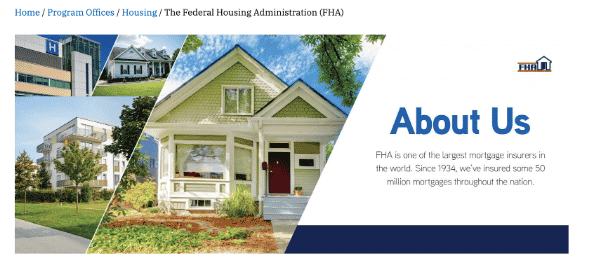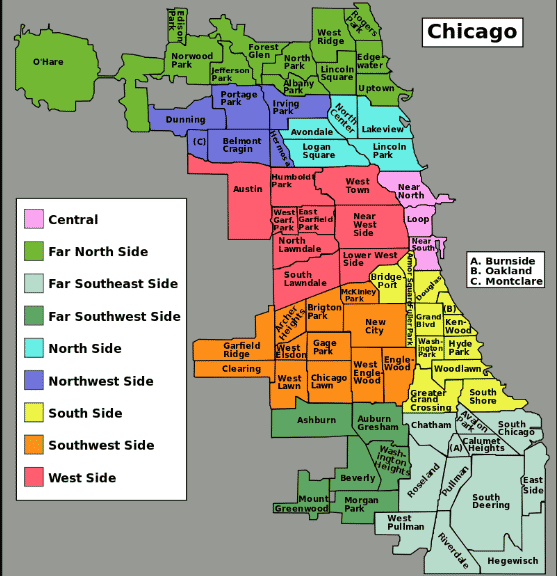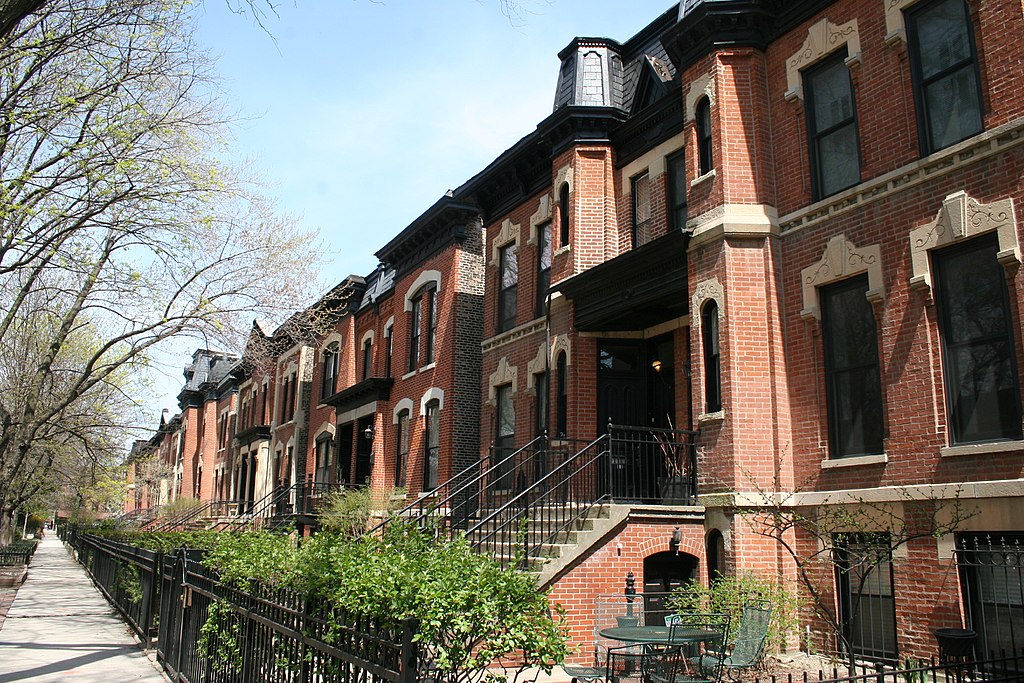In Chicago, FHA Loans are one of the most popular loans that we close (same with Indianapolis–go Indiana!). In fact, we actually close more FHA Loans than any lender in the country. But what exactly are FHA loans, their requirements, and FHA Loan Limits in Chicago?
Already know all of this and just want to get a Chicago FHA Loan? Get started on our 5-minute loan approval application today!
What is the FHA?
The Federal Housing Administration, or FHA, is a government agency operating within the U.S. Department of Housing and Urban Development (HUD). The goal of the FHA is to make mortgages accessible and affordable for lower-income and first-time homebuyers, multi-family rental properties, hospitals, and residential care facilities. They do this by insuring the loan, thereby protecting the mortgage lenders from potential losses.
The Federal Housing Administration was established in 1934 during the Great Depression, when the housing market drastically decreased as a result of the banks failing. Large down payment requirements of 30-50%, and short mortgage periods of five to 10 years meant that home ownership was out of reach for working class families.
Once the FHA was established, and with the granting of FHA-secured loans, down payment requirements went down, and the mortgage lifespan grew to 20-30 years. Since 1934, the FHA has insured over 50 million mortgages throughout the U.S., and is the largest mortgage insurer in the world.
What is an FHA Loan?

The Federal Housing Administration, or FHA, is a government agency operating within the U.S. Department of Housing and Urban Development (HUD). The goal of the FHA is to make mortgages accessible and affordable for lower-income and first-time homebuyers, multi-family rental properties, hospitals, and residential care facilities. They do this by insuring the loan, thereby protecting the mortgage lenders from potential losses.
The FHA Loan program traces its roots back to the Great Depression of the 1920’s and was created to give banks insurance protection, and to assist homeowners and new home purchasers when the foreclosure rates and defaults on loans were skyrocketing.
It now operates primarily to help borrowers that can’t afford a down payment, or won’t qualify for private mortgage insurance (PMI). It’s an insurance policy for the bank that guarantees the loan against default.
FHA percentages are also lower than are seen with traditional loans. The rate won’t change, excepting for credit score, amount borrowed or percent borrowed. A conventional loan uses loan adjusters that change the rates and percentages for the mortgage loan.
Banks and other lenders are willing to work with “higher risk borrowers,” knowing that the Federal Government is backing them. FHA loans have much to offer over conventional loans, such as:
- Lower qualifying credit scores
- Lower down payment requirements with more flexibility regarding the origin of the down payment (personal savings, gift, or even grants).
- Candidates can have a higher debt-to-income ratio
While these benefits make FHA loans appealing, there are some conditions to be aware of:
- FHA loans are only available for certain types of properties
- Some loans may require closing costs that don’t exist with conventional loans
- Every FHA loan requires mortgage insurance built into the loan
- Lenders may have their own rates, fees and approval processes separate to the FHA, so research is needed
- FHA loan limits restrict your borrowing power
We use FHA to offer refinancing as well, with half of our refinancing that we now do is through FHA Loans. They allow the borrower to get a mortgage on up to 97.5 percent of the home’s value instead of topping out at 90-95% for a conventional loan.
The Home Loan Expert actually underwrites our Chicago FHA mortgage loans in house, because we’re a Direct Endorsed FHA Lender. Many mortgage companies–particularly those that gave up their FHA endorsement status during the early 2000’s when they weren’t being used extensively, have issues becoming an approved FHA lender again–while we maintained our FHA status so that we could continue to underwrite and close FHA loans.
Types of FHA Loans
The FHA offers specialized mortgage loans for specific audiences that can help you afford your dream home. Here’s a bit about each one:
Traditional Mortgage Loan: This is a regular mortgage loan that applicants can use for their primary residence.
203(k) Mortgage Program: This is a traditional mortgage with extra money added for home repairs and renovations. If you purchase a home that needs some TLC, this is the loan for you.
Section 245(a) Loan: Maybe you started a business and need a few months to get the profits flowing. Or, you’re promised a promotion in the next few months at your current corporate job. This Graduated Mortgage Payment (GPM) loan starts with monthly payments at a certain amount that increases over time. You can also opt for the Graduated Equity Mortgage (GEM) loan, which increases monthly principal payments specifically over time to gain more equity in your home faster.
FHA Energy-Efficient Mortgage: Interested in making environmentally friendly home upgrades to save energy? This loan includes extra funds to do so. Examples of eligible upgrades include new solar panels or insulation to retain heat.
Home Equity Conversion Mortgage (HECM): If you’re a senior, you might struggle to find retirement options if you don’t have a solid pension plan. The Home Equity Conversion Mortgage (HECM) is a reverse mortgage that offers mortgage payments to the applicant in exchange for equity in their home. You can receive the payments every month or withdraw them at your discretion through a line of credit. You might consider a combination of these two options.
Now that you’re up to speed on FHA Loans, let’s explore the FHA Loan Limits Ohio offers.
What will disqualify an FHA Loan?

FHA Loans require certain criteria in order for homes to meet the minimum standards for a loan to be approved by a participating lender. Reasons an FHA Loan may be disqualified are:
- Homes must be primarily residential: If the home is not primarily used for residential purposes and has 50% or more floor space taken up for non-residential use, it cannot qualify for an FHA mortgage.
- Compliance issues and FHA appraisal standards: If a home is in a state of severe repair it may be disqualified for an FHA loan. However, there are FHA Rehabilitation loans for homes that do not pass an appraisal for the typical FHA loan.
- Home may be near certain flood zones without insurance: Certain natural disaster zones do not automatically disqualify an home buyer from a FHA loan. However, if the necessary insurance is not available in the area it may result in disqualification.
- Property is too close to potential hazards: If the home is too close to areas that are considered “potential hazards” like high voltage electrical wires, mining and high-pressure gas lines, a FHA loan may not be possible.
- Transient occupancy properties are not in compliance: FHA loans cannot be used on homes that will be rented out to individuals that will be staying at the property for less than 30 days. FHA loans cannot be used for bed-and-breakfasts, condo hotels, Airbnb’s and other occasional rentals. situations.
Want help determining your Chicago FHA Loan eligibility? Get started on our 5-minute loan approval application today!
What is an FHA Loan Limit?
An FHA Loan limit is the maximum loan amount you can borrow while still having the FHA insure that loan. FHA Loans have been a success for many homeowners, and offer many people greater affordability and access to credit that they otherwise might not be eligible for with a regular bank.
How are FHA Loan Limits Determined?
The FHA determines loan limits based on the region, cost of living, average construction costs, and the average home sale price for a particular area. Every year, the FHA updates the FHA Loan limit depending on changes in all the above factors for different states and counties.
Areas with lower costs have a “floor” limit which is lower than average, while higher-cost areas have a “ceiling” limit that is higher than average. Otherwise, the FHA Loan limit is typically 115% of the median price of a state or city’s average home, provided the amount is before the area’s ceiling and floor limits.
Some regions are considered “special exceptions,” where the FHA allows for higher loan limits due to increased construction costs.
What are the FHA Loan Limits in Chicago?

In 2022, FHA Loan Limits have increased by $65,000. The new baseline FHA Loan limits in Chicago are as followed:
- Single-family homes: $420,680
- Duplex: $538,650
- Tri-plex: $651,050
- Four-plex: $809,150
What are the FHA Loan Limits in Illinois?
FHA Loan Limits in the state of Illinois vary depending on the county. Overall, FHA Loans can be a great option as a loan for first-time homebuyers in Illinois.
Read our full review of Illinois FHA Loan Limits (and Requirements) here!
How to Apply for an FHA Loan in Chicago
Individual lenders might have some variation in their FHA Loan requirements, but the basics are the same. Before anything else, you’ll need:
- Valid Social Security number
- Proof of residence in the United States
- Legal age according to your state
After you meet these qualifications, an FHA Loan is easier to obtain than a traditional mortgage. Here are some more specific FHA Loan requirements:
- Minimum credit score: 500
- Loan term length: 15 or 30 years
- Minimum down payment: 3.5% for credit scores over 580; 10% for credit scores between 500-579
- Down payment gift: Entire down payment can be a gift
- Down payment assistance: Programs available
- Mortgage insurance: Upfront and every year for the life of the loan or 11 years
- Mortgage insurance premiums: 1.75% up front; 0.45%-1.05% annually
If your credit score is less than 500, consider lowering your debt-to-income ratio, setting alarms to avoid late payments, or delaying your mortgage application until your credit score is a bit higher.
Important FHA Loan Terms
As you learn more about FHA Loan requirements, limits, and more, it’s essential to keep track of some standard terms that might pop up. Here are some important FHA Loan terms for your reference:
FHA: Federal Housing Administration
Ceiling: Higher FHA Loan limit than usual for higher-cost living areas
Floor: Lower FHA Loan limit than usual for lower-cost living areas
Mortgage Insurance: Insurance you must pay every month to protect yourself in case you default on loan payments. Having this insurance is often a requirement for many FHA Loans.
203(k) Mortgage Loan: FHA Loan for people that need to make major renovations to their new home
Home Equity Conversion Mortgage: Reverse mortgage FHA Loan for seniors aged 62+
Section 245(a) Loan: Graduated Mortgage Payment (GPM) with increased monthly payments over time; Graduated Equity Payments with increased principal monthly payments over time.
FHA Energy-Efficient Mortgage: FHA Loan that accounts for costs to make energy-efficiency upgrades to a new home, like solar panel installation
Conclusion: Applying for an FHA Loan in Chicago, Illinois
Our process for home loan approval allows us to quickly process and approve FHA loans for families, giving them a way to move into their dream home and establish their lives. Since 2002, we’ve closed over $500 million in FHA loans for families in Missouri, Illinois, Indiana, Wisconsin, and Iowa.
Whether you’re looking to purchase a new home or refinance one in Chicago, Aurora, Elgin, Joliet, Naperville, Arlington Heights, Berwyn, Bolingbrook, Cicero, Des Plaines, Evanston, Gary, Hammond, Hoffman Estates, Mount Prospect, Oak Lawn, Oak Park, Orland Park, Palatine, Schaumburg, Skokie, Tinley Park, Waukegan, Wheaton…or anywhere in the Chicago area, call Chicago’s home loan expert below, or apply online at www.thehomeloanexpert.com.
Ryan Kelley
800-991-6494

